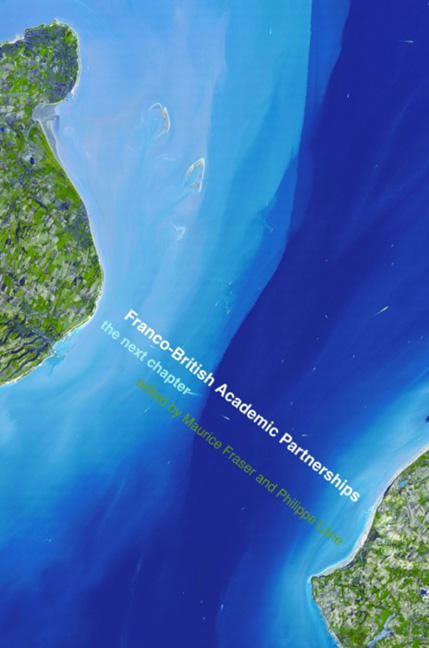Book contents
- Frontmatter
- Contents
- Notes on Contributors
- Foreword by His Excellency
- Foreword
- Preface
- Part I: Teaching and Training Partnerships
- Part II: Research Partnerships
- Part III: Broader Perspectives
- Appendices: Addresses and Speeches at the Franco-British Academic Partnerships Seminar, French Institute, London, 5 February 2010
- 1 David Willetts, Mp: Shadow Minister for Universities and Skills
- 2 Valérie Pécresse: Ministre de l'Enseignement Supérieur et de la Recherche
- 3 Rick Trainor: Principal, King's College London
- 4 Florentine Petit: Direction des Relations Européennes et Internationales et de la Coopération, Ministère de l'Enseignement Supérieur et de la Recherche
- 5 Brigitte Porée: The French Grandes Écoles and British Universities: Director of International Affairs, Conférence des Grandes Écoles
- 6 Monique Canto-Sperber: Director of the École Normale Supérieure, Paris
- 7 Sir Howard Davies: Franco-British University Collaboration – Can We Realise Churchill's 1940 Vision?: Director of the London School of Economics and Political Science
- 8 Adam Steinhouse: Academic–Government Partnerships – A Pragmatic View: Head of School of European Studies at the National School of Government
- 9 Hélène Duchêne: Directeur des Politiques de Mobilité et d'Attractivité, Direction de la Mondialisation, du Développement et des Partenariats, Ministère des Affaires Étrangères
- 10 Support for Higher Education from the French Embassy: Philippe Lane and Serge Plattard
- 11 Strengths and Opportunities in the British University System: Philippe Lane and Serge Plattard
5 - Brigitte Porée: The French Grandes Écoles and British Universities: Director of International Affairs, Conférence des Grandes Écoles
from Appendices: Addresses and Speeches at the Franco-British Academic Partnerships Seminar, French Institute, London, 5 February 2010
- Frontmatter
- Contents
- Notes on Contributors
- Foreword by His Excellency
- Foreword
- Preface
- Part I: Teaching and Training Partnerships
- Part II: Research Partnerships
- Part III: Broader Perspectives
- Appendices: Addresses and Speeches at the Franco-British Academic Partnerships Seminar, French Institute, London, 5 February 2010
- 1 David Willetts, Mp: Shadow Minister for Universities and Skills
- 2 Valérie Pécresse: Ministre de l'Enseignement Supérieur et de la Recherche
- 3 Rick Trainor: Principal, King's College London
- 4 Florentine Petit: Direction des Relations Européennes et Internationales et de la Coopération, Ministère de l'Enseignement Supérieur et de la Recherche
- 5 Brigitte Porée: The French Grandes Écoles and British Universities: Director of International Affairs, Conférence des Grandes Écoles
- 6 Monique Canto-Sperber: Director of the École Normale Supérieure, Paris
- 7 Sir Howard Davies: Franco-British University Collaboration – Can We Realise Churchill's 1940 Vision?: Director of the London School of Economics and Political Science
- 8 Adam Steinhouse: Academic–Government Partnerships – A Pragmatic View: Head of School of European Studies at the National School of Government
- 9 Hélène Duchêne: Directeur des Politiques de Mobilité et d'Attractivité, Direction de la Mondialisation, du Développement et des Partenariats, Ministère des Affaires Étrangères
- 10 Support for Higher Education from the French Embassy: Philippe Lane and Serge Plattard
- 11 Strengths and Opportunities in the British University System: Philippe Lane and Serge Plattard
Summary
The Conférence des Grandes Écoles
The Conférence des Grandes Écoles (CGE) is a non-profit association founded in 1973. By 2010, the CGE had 291 members:
• 222 Grandes Écoles, representing 120,000 students and 30,000 graduates per year (149 Grandes Écoles of engineering, 38 of management and 22 of other specialties, as well as 13 universities abroad);
• 21 companies;
• 48 organisations or institutions in higher education.
The Grandes Écoles cover several fields of study: engineering sciences and management but also the arts, military training, veterinary medicine and teacher training.
They can be state or private institutions. Public Grandes Écoles are placed (for practical, administrative and financial reasons) under the authority of different Ministries: Higher Education, Agriculture, Defence, Industry, Economy, Infrastructure and Public Works. Most management schools were created and are supervised by chambers of commerce and industry.
They award diplomas (diplôme d'ingénieur, diplôme de management) which are equivalent to a master's degree. They are all under the pedagogical authority of the Ministry of Higher Education.
The role of the CGE is:
• to facilitate the transfer information between its members and to develop their solidarity;
• to promote the Grande École system on both a national and an international scale;
• to encourage innovations in engineering and management education;
• to develop continuing education and research activities;
• to act as a voice with governmental policy makers and the research community.
Admission to the CGE
The institutions applying for membership of the CGE must fulfil specific criteria, including:
• graduate degrees accredited by the Ministry of Education;
• admission through a nationwide competitive examination;
• five years of study after the Baccalaureat (end of secondary school qualification) for a master's degree;
• a track record of degrees having been awarded for at least three years;
• autonomy in financial and educational matters;
• quality of the teaching and research faculty;
• quality of the equipment;
• research activities;
• international focus.
Partnerships with British Universities
Agreements
Approximately 860 agreements with British universities have been signed by Grandes Écoles, mainly for student exchange but also for cooperation in research. Of these, 170 are double or dual degree agreements.
The favourite partners of French engineering schools are:
• University of London (32 agreements);
• Imperial College of Science, Technology and Medicine (27);
• Cranfield University (25);
• University of Southampton (23);
• University of Bristol (22).
- Type
- Chapter
- Information
- Franco-British Academic PartnershipsThe Next Chapter, pp. 211 - 214Publisher: Liverpool University PressPrint publication year: 2011



